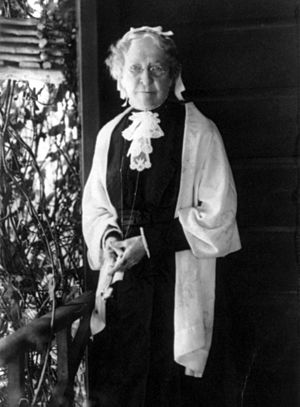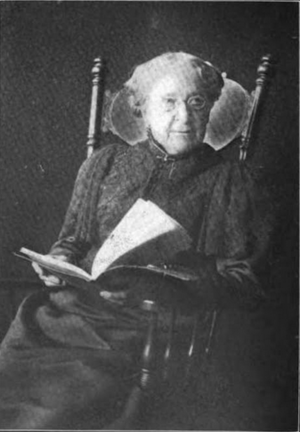Caroline Severance facts for kids
Quick facts for kids
Caroline Severance
|
|
|---|---|

Severance in 1910
|
|
| Born |
Caroline Maria Seymour
January 12, 1820 Canandaigua, New York, US
|
| Died | November 10, 1914 (aged 94) Los Angeles, California, US
|
| Other names | Caroline Maria Seymour Severance |
| Signature | |
Caroline Maria Seymour Severance (1820–1914) was an important American activist. She worked to end slavery and fought for women's right to vote. She also started many women's clubs, which were groups where women could meet, learn, and work for social change.
Contents
Early Life and Education
Caroline Maria Seymour was born on January 12, 1820, in Canandaigua, New York. Her father was a banker. When she was four years old, her father died, and her family moved to Auburn, New York.
Caroline went to several schools, including the Upham Female Seminary. She graduated at age fifteen from Miss Ricord's Female Seminary in Geneva in 1835. After graduating, she taught at the Auburn Female Seminary for a short time.
In 1840, Caroline married Theodoric C. Severance, who was known as T.C. He was a banker and also believed strongly in ending slavery. They had five children together.
The couple first lived in Cleveland, Ohio. Their home became a popular meeting spot for people who cared about social causes. They were very active in the movement to end slavery. Later, in 1855, they moved to Boston, Massachusetts.
Fighting for Women's Rights
Caroline Severance became very dedicated to social justice and peace. She was inspired by famous thinkers like Ralph Waldo Emerson.
In 1853, she gave her first public speech to the Mercantile Library Association in Cleveland. This was a big deal because she was the first woman to speak there. Her speech was called "Humanity: A Definition and a Plea." She argued that women should be fully included in the idea of "humanity." The audience and newspapers liked her speech. That same year, she led the first meeting of the Ohio Women's Rights Association.
In 1854, Caroline and her husband were elected to leadership roles for the Fourth National Women's Rights Convention. She also spoke to the Ohio Legislature, asking for women to be allowed to keep their own inherited property and earnings.
Severance was a pioneer in many ways. She was the first woman to be a member of the Parker Fraternity Course and the first woman to give a lecture at the Lyceum Association in Boston.
After the Civil War, she helped create the New England Women's Hospital. She also worked with Susan B. Anthony to fight against adding the word "male" to the Fourteenth Amendment. This amendment was about citizenship rights, and they wanted to make sure it didn't limit women's rights.
Starting Women's Clubs
In 1867, Caroline Severance started the first women's club in the United States, called the New England Women's Club. Famous people like Ralph Waldo Emerson and Julia Ward Howe spoke at its first meeting. This club did many important things. It gave scholarships, offered educational chances for women, supported the kindergarten movement, and pushed for women to be hired as police officers.
Later, in 1869, when there were disagreements among women's suffrage groups, Severance helped start the American Woman Suffrage Association. This group worked to get women the right to vote.
Moving to Los Angeles
In 1875, Caroline and T.C. Severance moved to Los Angeles, California. They bought a small home they called "Red Roof." Their move was partly because of T.C.'s health and because their sons had moved to the West Coast.
Both Caroline and T.C. had a huge impact on Los Angeles. In 1877, they founded the First Unitarian Church of Los Angeles. T.C. also helped start the Orphan's Home Society.
Caroline quickly began organizing women in the growing city. She brought the kindergarten movement to Los Angeles and became president of the city's Free Kindergarten Association. She also helped create the Los Angeles Public Library. In 1878, she started the first Los Angeles Women's Club.
Her interests were wide-ranging, from women's right to vote to protecting historic buildings and working for world peace. As she got older, people saw her as a wise leader in women's rights. She was even called "Madame Severance" in the newspapers, showing how much she was respected.
The Friday Morning Club
The Severances loved Boston, but they also became big supporters of their new home in Los Angeles. Caroline's first women's club in Los Angeles struggled when she was away. So, in 1881, she started a new, lasting group called the Friday Morning Club. This club focused on culture, social improvement, and making civic changes. It had a lending library, helped people find jobs, and offered classes. It became one of the most powerful and respected organizations in Los Angeles.
After her husband died in 1892, Caroline Severance changed the name of her home to "El Nido," which means "the nest" in Spanish. Her home became a popular place for people who wanted to make social changes.
Women's Right to Vote in California
In 1911, women in California finally won the right to vote. Caroline Severance was praised as the spiritual leader of the suffrage movement in Southern California. Even though she was very old and couldn't participate much in the campaign, she was featured in every Los Angeles newspaper the day after the election.
It's often said that she was the first woman to register to vote in California, but this isn't quite true. She registered a week after the election when a registrar came to her home. However, she did go to the polls the next year to vote in the presidential election. In 1912, at 92 years old, she cast her vote for president, after working for women's suffrage for more than sixty years.
Death
Caroline Severance died on November 10, 1914, at the age of 94.
Images for kids
 | George Robert Carruthers |
 | Patricia Bath |
 | Jan Ernst Matzeliger |
 | Alexander Miles |



